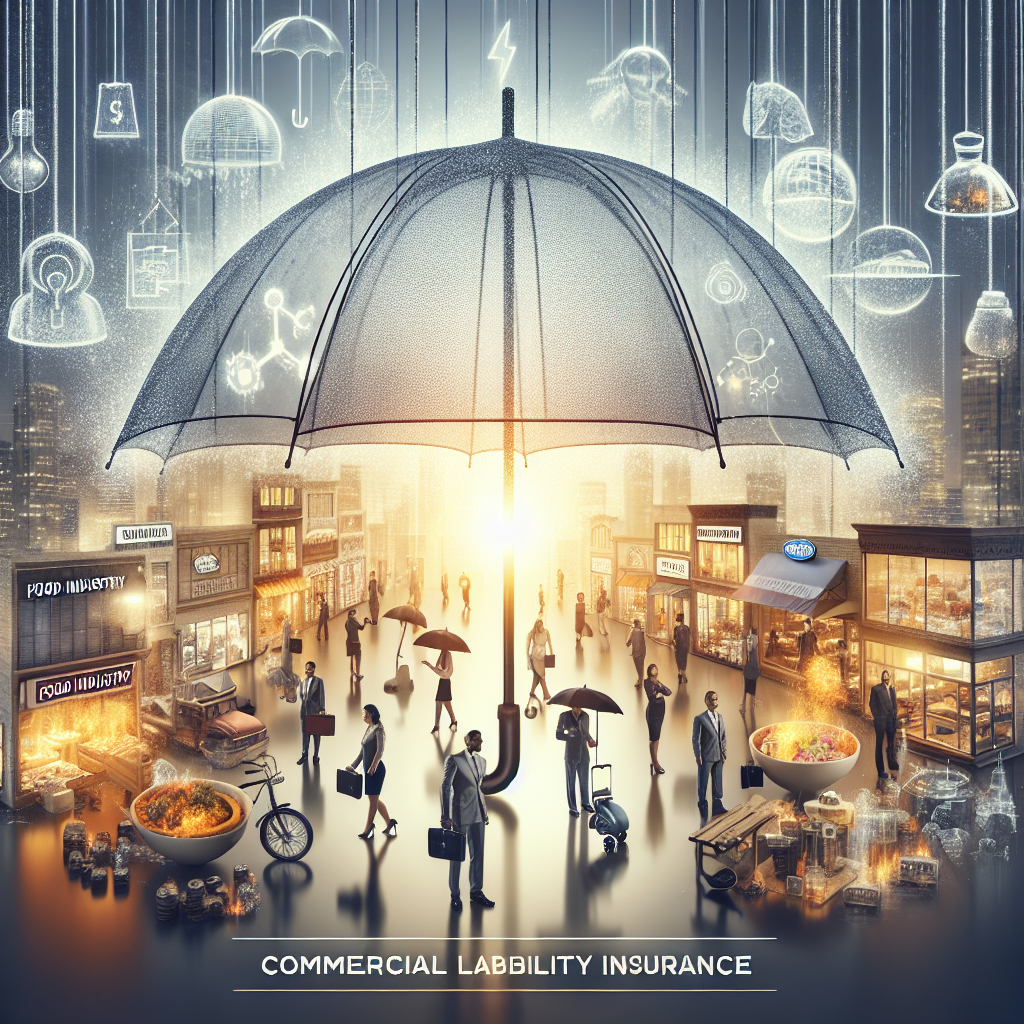Commercial liability insurance
If you own a business, commercial liability insurance is a must-have. It helps protect you from financial losses in case someone gets injured or their property gets damaged as a result of your business operations. But what exactly does this type of insurance cover? Well, for starters, it provides coverage for bodily injury and property damage claims made by third parties. It also includes coverage for advertising and personal injury, which may arise from things like defamation or copyright infringement. And the best part? Commercial liability insurance can be tailored to meet the specific needs of your business, ensuring that you have the right level of protection. So, whether you run a small business or a large corporation, having commercial liability insurance is essential for safeguarding your business and giving you peace of mind.
Commercial Liability Insurance
What is Commercial Liability Insurance?
Commercial liability insurance is a type of insurance coverage that protects businesses from financial losses resulting from claims of property damage or bodily injury caused by the business’s operations, products, or services. This insurance provides coverage for legal costs, settlements, and judgments that a business may be required to pay if found liable for such claims.
Types of Commercial Liability Insurance Coverage
There are various types of commercial liability insurance coverage available to businesses. Some common types include:
-
General Liability Insurance: This coverage protects businesses from third-party claims for bodily injury, property damage, and advertising injury. It typically covers legal costs, medical expenses, and damages resulting from these claims.
-
Product Liability Insurance: This coverage is specifically designed for businesses that manufacture, distribute, or sell products. It provides protection against claims arising from injuries or property damage caused by a defective product.
-
Professional Liability Insurance: Also known as errors and omissions insurance, this coverage is essential for professionals who provide advice or services to clients. It protects businesses from claims of negligence, errors, and omissions that result in financial loss for the client.
-
Cyber Liability Insurance: In today’s digital age, businesses face increasing risks of data breaches, cyber-attacks, and other cyber threats. Cyber liability insurance provides coverage for costs associated with data breaches, identity theft, and other cyber incidents.

Benefits of Commercial Liability Insurance
Commercial liability insurance offers several benefits to businesses. Here are some key advantages:
-
Financial Protection: One of the primary benefits of commercial liability insurance is that it provides financial protection for businesses. It covers legal costs, settlements, and judgments, which can be significant and potentially devastating for a business.
-
Peace of Mind: By having commercial liability insurance, business owners can have peace of mind knowing that they are protected from potential lawsuits and claims. This allows them to focus on growing their business without constantly worrying about the financial consequences of accidents or incidents.
-
Client Confidence: Having commercial liability insurance can also instill confidence in clients and customers. It shows that the business takes responsibility for its actions and is prepared to address any potential issues that may arise.
-
Compliance with Contractual Obligations: Many businesses, especially those that work with government agencies or larger corporations, require proof of commercial liability insurance as part of contractual agreements. Having this insurance coverage helps businesses meet these requirements and secure valuable contracts.
Factors to Consider When Choosing Commercial Liability Insurance
When selecting commercial liability insurance for your business, there are several factors you should consider. These include:
-
Coverage Limits: It’s important to evaluate the coverage limits offered by different insurance providers. Ensure that the coverage limits are sufficient to protect your business from potential liabilities.
-
Deductibles: Understand the deductibles associated with the insurance policy. A higher deductible may result in lower premiums, but it also means you’ll have to pay more out-of-pocket in the event of a claim.
-
Exclusions: Carefully review the exclusions of the insurance policy. Some policies may exclude certain types of claims or specific industries. Make sure the coverage aligns with the risks associated with your particular business.
-
Premiums: Compare premiums from different insurance providers to find the most competitive rates. However, keep in mind that the cheapest option may not always provide the best coverage for your business’s needs.
-
Insurance Provider Reputation: Research the reputation and financial stability of the insurance provider. Look for reviews, ratings, and feedback from other businesses to ensure you choose a reliable insurance company.

How to Get Commercial Liability Insurance
Obtaining commercial liability insurance for your business is relatively straightforward. Here are the steps to follow:
-
Assess Your Risk: Identify the specific risks associated with your business’s operations or products. This will help you determine the appropriate coverage needed.
-
Seek Professional Assistance: Consider consulting with an insurance broker or agent who specializes in commercial insurance. They can help assess your needs, compare quotes from multiple insurance providers, and assist you in selecting the right policy.
-
Gather Necessary Information: Prepare the necessary information about your business, such as its size, industry, annual revenue, and claims history. Insurance providers will require this information to provide accurate quotes.
-
Request Quotes: Contact multiple insurance providers and request quotes for commercial liability insurance. Provide them with the information gathered in the previous step to receive accurate quotes tailored to your business’s needs.
-
Compare Policies: Once you have received quotes from different providers, compare the coverage, limits, exclusions, and premiums to determine which policy offers the best value for your business.
-
Purchase Insurance: Finally, select the insurance policy that best meets your business’s needs and budget. Work with the insurance provider to complete the necessary paperwork and secure your commercial liability insurance coverage.
Commercial Liability Insurance for Small Businesses
Small businesses, in particular, can greatly benefit from commercial liability insurance. Operating a small business often involves tight budgets and limited resources, which makes the impact of unexpected legal costs even more significant. Commercial liability insurance provides small businesses with the necessary protection to mitigate financial risks associated with claims or lawsuits. It ensures that a single unexpected incident does not jeopardize the business’s future.
Commercial Liability Insurance for Large Businesses
Large businesses typically face a higher volume and magnitude of risks compared to small businesses. Commercial liability insurance becomes crucial for large businesses to protect their assets, reputation, and bottom line. With larger operations and a higher likelihood of claims, commercial liability insurance allows large businesses to manage potential liabilities and protect their financial stability. It provides the resources needed to face costly legal battles and ensures that the business can continue to operate smoothly despite any claims or lawsuits that may arise.
Common Exclusions in Commercial Liability Insurance
Although commercial liability insurance provides broad coverage, it’s important to be aware of common exclusions that may affect your claim. Some common exclusions in commercial liability insurance include:
-
Employee Injuries: Commercial liability insurance generally does not cover injuries sustained by employees. Instead, workers’ compensation insurance is specifically designed to cover employee injuries that occur in the workplace.
-
Intentional Acts: Intentional acts or deliberate wrongdoing by a business or its employees are typically excluded from commercial liability insurance coverage. These acts are considered beyond the scope of normal business operations.
-
Professional Errors: Commercial liability insurance may not cover claims arising from professional errors or mistakes, as these are typically covered by professional liability insurance.
-
Pollution Claims: Coverage for claims related to pollution, environmental damage, or contamination is often excluded from standard commercial liability insurance. Separate pollution liability insurance may be required to provide coverage for these risks.
-
Employment Practices: Claims related to employment practices, such as wrongful termination or discrimination, are often excluded from commercial liability insurance. Employment practices liability insurance (EPLI) provides coverage for these specific risks.
It’s important to carefully review your insurance policy and discuss any exclusions with your insurance provider to ensure you have the necessary coverage for your specific risks.
Claims Process for Commercial Liability Insurance
If you need to file a claim under your commercial liability insurance policy, here’s a general overview of the claims process:
-
Notify Your Insurance Provider: As soon as an incident occurs that may result in a claim, promptly notify your insurance provider. Provide them with all relevant details about the incident, including any documentation or evidence available.
-
Provide Documentation: Your insurance provider will likely require documentation to support your claim. This may include incident reports, witness statements, photographs, invoices, medical records, or any other relevant information.
-
Investigate the Claim: Your insurance provider will conduct an investigation into the claim, which may involve gathering additional information, interviewing witnesses, or consulting with experts.
-
Evaluate Liability: The insurance provider will assess the liability of your business based on the evidence and information gathered during the investigation. If liable, the insurance provider will determine the appropriate coverage and potential settlement amount.
-
Negotiate or Litigate: Depending on the circumstances, your insurance provider may negotiate a settlement with the claimant to resolve the claim. If a settlement cannot be reached, litigation may be necessary to resolve the dispute in court.
-
Settlement and Payment: If a settlement is reached or a judgment is made in favor of the claimant, your insurance provider will handle the payment of the settlement or judgment up to the policy’s coverage limits.
It’s important to work closely with your insurance provider throughout the claims process. Promptly provide any requested information and maintain open communication to ensure a smooth and efficient resolution of your claim.
Conclusion
Commercial liability insurance is an essential investment for businesses of all sizes. It provides financial protection, peace of mind, and ensures that unexpected claims or lawsuits do not derail the business’s success. By understanding the types of coverage available, considering important factors when selecting insurance, and following the claims process, business owners can effectively manage risks and safeguard their businesses from potential liabilities. With the right commercial liability insurance in place, businesses can focus on their growth and success while being prepared for any unexpected challenges that may arise.
















It's great that you talked about how business insurance can provide financial protection against unexpected events and help ensure the…
I like that you mentioned how business insurance is essential for protecting your bottom line and the long-term viability of…